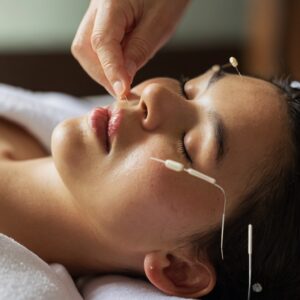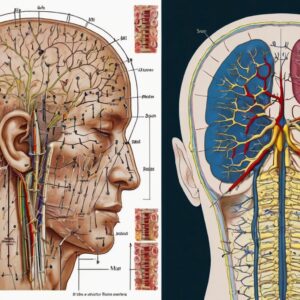Acupuncture, a cornerstone of Traditional Chinese Medicine (TCM) for millennia, continues to spark curiosity and sometimes, skepticism. Thin needles, strategic insertion points, and the promise of holistic healing can raise questions. Let’s address some common myths surrounding acupuncture and shed light on the science behind this time-tested practice. 
Myth #1: Acupuncture is Painful
Fact: The image of sharp needles might be intimidating, but acupuncture needles are incredibly thin and finer than a human hair. The insertion process is often described as a slight tickle or pressure. Most patients experience minimal to no discomfort during treatment. Dr. Neil Spiegel, a prominent acupuncturist, emphasizes that patients often describe the sensation as a “mild tingling or slight pressure” (https://www.drneilspiegel.com/services/acupuncture).
Myth #2: Acupuncture Lacks Scientific Backing
Fact: Acupuncture is no longer a mystery from the East. Numerous scientific studies validate its effectiveness for various conditions. The Cleveland Clinic, a world-renowned medical center, highlights research supporting acupuncture for pain management, migraine relief, and even recovery after cancer treatment (https://www.mayoclinic.org/tests-procedures/acupuncture/about/pac-20392763).
Myth #3: Acupuncture is Just a Placebo Effect
Fact: While the placebo effect can play a role in any treatment, acupuncture’s benefits go beyond the power of suggestion. Studies have shown that acupuncture triggers physiological changes in the body. It stimulates the release of endorphins, the body’s natural painkillers, and influences neurotransmitter activity, contributing to pain relief and overall health improvements (https://www.pennmedicine.org/cancer/navigating-cancer-care/treatment-types/integrative-oncology/acupuncture).
Myth #4: Acupuncture is Only for Pain Relief
Fact: Pain management is a well-known benefit of acupuncture, but its applications extend far beyond that. This holistic practice addresses a wide range of health issues, including:
- Stress and Anxiety: Acupuncture can promote relaxation and reduce stress hormones, aiding in managing anxiety and insomnia.
- Digestive Disorders: Studies indicate acupuncture can alleviate nausea and vomiting associated with pregnancy and chemotherapy, and may also improve symptoms of irritable bowel syndrome (IBS).
- Allergies: Research suggests acupuncture can help reduce allergy symptoms, including hay fever and allergic rhinitis.
- Reproductive Health: Acupuncture can be used to regulate menstrual cycles and address fertility concerns.
UK HealthCare, a reputable healthcare provider, emphasizes acupuncture’s holistic approach, which can benefit various bodily systems, promoting overall well-being (https://ukhealthcare.uky.edu/wellness-community/blog/uk-healthcast-what-you-need-know-about-acupuncture).
Myth #5: Acupuncture is Unsafe
Fact: Acupuncture is generally safe when performed by a licensed and qualified practitioner using sterile, disposable needles. Serious side effects are extremely rare. Minor side effects, like slight bruising or soreness at the needle insertion site, are infrequent and typically resolve quickly.
The key to a safe acupuncture experience lies in choosing a certified professional. Look for acupuncturists licensed by your state’s medical board and certified by the National Certification Commission for Acupuncture and Oriental Medicine (NCCAOM).
Boost Your Acupuncture Results: Unlock the Power of Hyperbolic Stretching
Statistics on Acupuncture Usage:

- 2.1 million adults in the United States used acupuncture in 2018, according to the National Center for Complementary and Integrative Health (NCCIH) (https://www.ncbi.nlm.nih.gov/books/NBK532287/).
- An estimated 30 million Europeans utilize acupuncture annually (https://www.ncbi.nlm.nih.gov/books/NBK532287/).
Is Acupuncture a Placebo Effect?
The effectiveness of acupuncture goes beyond the placebo effect. While the placebo response can play a role in any treatment, research suggests acupuncture has a measurable physiological impact (Myth #3). Studies have shown it can:
- Stimulate endorphin release: Endorphins are the body’s natural painkillers. Acupuncture may trigger their release, contributing to pain relief.
- Influence neurotransmitters: Acupuncture can affect the activity of neurotransmitters, chemicals that influence pain perception and overall well-being.
These physiological changes, combined with the potential for relaxation and stress reduction during treatment, contribute to acupuncture’s benefits.
Why Are People Skeptical of Acupuncture? Unveiling Common Misconceptions
Acupuncture, despite its long history, can still spark curiosity and even skepticism. Here’s a breakdown of some common reasons why people might be hesitant:
- Fear of Needles: “Acupuncture needles” often conjure up images of sharp, painful instruments. However, these needles are incredibly thin and hair-like, making the insertion process much less intimidating (Myth #1).
- Lack of Awareness: Many people might not be fully aware of the scientific evidence supporting acupuncture’s effectiveness for various conditions (Myth #2).
- Placebo Effect Concerns: Some might wonder if acupuncture’s benefits are simply due to the placebo effect. While the placebo response can play a role in any treatment, research suggests acupuncture has a measurable physiological impact beyond suggestion (Myth #3).
- Focus on Pain Management: The association of acupuncture primarily with pain relief might limit understanding of its wider applications for stress, digestive issues, allergies, and more (Myth #4).
- Safety Concerns: Misconceptions about the safety of acupuncture can arise. When performed by a qualified professional using sterile needles, acupuncture is a safe and well-tolerated practice (Myth #5).
By addressing these misconceptions and highlighting the growing body of scientific research, we can foster a more informed understanding of acupuncture’s potential benefits.
Is There Any Evidence Behind Acupuncture?
Yes, there is significant scientific evidence supporting acupuncture’s effectiveness for a variety of health concerns. Here’s how this article debunks the myth of acupuncture lacking scientific backing:
- Mounting Research: Numerous scientific studies validate acupuncture’s benefits (Myth #2).
- Credible Sources: Renowned medical institutions like the Cleveland Clinic highlight research on acupuncture for pain management, migraines, and even cancer recovery (Myth #2).
- Physiological Impact: Studies show acupuncture goes beyond placebo by triggering physiological changes in the body. It stimulates the release of endorphins (natural painkillers) and influences neurotransmitters, contributing to pain relief and overall health improvements (Myth #3).
While acupuncture may not be a one-size-fits-all solution, there’s compelling scientific evidence suggesting its effectiveness for various health issues.
Finding a Qualified Acupuncturist
Finding the right acupuncturist can significantly enhance your experience. Here are some tips to guide you:
- Licensing and Certification: Be certain that your chosen acupuncturist is licensed by your state’s medical board and holds a national certification from the National Certification Commission for Acupuncture and Oriental Medicine (NCCAOM) (https://www.nccaom.org/).
- Experience and Specialization: Consider the acupuncturist’s experience level and areas of specialization. Some practitioners may focus on specific conditions like pain management or fertility.
- Consultation: Schedule a consultation to discuss your health concerns and expectations. This allows you to ask questions and assess the practitioner’s communication style and bedside manner.
- Online Resources: The American College of Traditional Chinese Medicine (ACTCM) and the National Center for Complementary and Integrative Health (NCCIH) maintain directories of qualified acupuncturists (https://www.actcm.edu/about-us, https://www.nccih.nih.gov/).
Acupuncture: A Path to Integrated Wellness
Acupuncture offers a unique approach to health and well-being. By integrating it with conventional medicine, you can create a comprehensive treatment plan that addresses your physical and emotional needs. Here are some additional points to consider:
- Communication with your Primary Care Physician: Always inform your primary care physician about your decision to pursue acupuncture treatment. This ensures a coordinated approach to your overall health.
- Realistic Expectations: Acupuncture is not a quick fix. While some may experience immediate relief, most benefit from a series of treatments. Be patient and open to the process.
- Complementary, Not Replacement: Acupuncture is best viewed as a complementary therapy alongside conventional medicine. It should not replace necessary medical treatments.
By approaching acupuncture with an open mind and informed perspective, you can unlock its potential to enhance your health and well-being.
Conclusion
Acupuncture is a time-tested practice with a growing body of scientific evidence supporting its effectiveness. By debunking these common myths, we encourage open-mindedness towards acupuncture as a valuable complement to conventional medical treatments. For individuals seeking to address various health concerns and enhance their well-being, acupuncture offers a holistic and scientifically-backed approach to healing.


